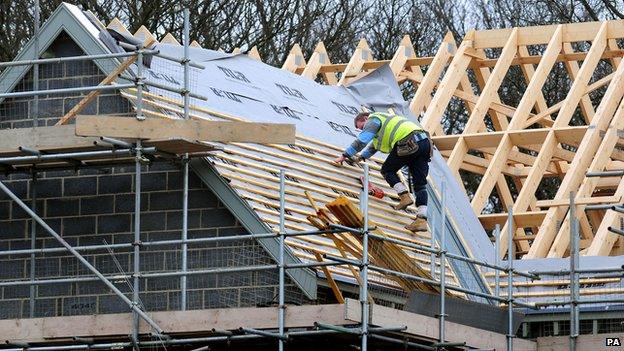Housing problems for the future
- Published
- comments

With the release of the final housebuilding figures before the general election, we can judge how successful the coalition has been in its pledge to "unlock the housing market, get Britain building again, and give many more people the satisfaction and security that comes from stepping over their own threshold".
And the short answer is "not very".
In England, where the problem is at its most acute, experts suggest we need to build 245,000 new homes every year to provide for rising population and extra households. But at no time since the last election has the figure reached even half that.
The number of new homes completed in 2014 in England was 118,760.
Now, ministers will make the point the economic downturn hit the building sector hard and we are still experiencing the legacy of the nosedive in new housebuilding from 2008 onwards. It can take a number of years from planning a new home to completing the project.
But the government has not managed to create conditions for a big increase in housing starts either.
In the last quarter of 2014, builders started constructing 29,800 homes in England. In the same quarter the previous year, the figure was 32,650.
Rising rents
It is true housing starts for the whole of 2014 (136,120) are slightly up on 2013, but we are a long way from even starting to build anything like the number of homes needed.
"The economic and social consequences of this failure have affected millions: costing jobs; forcing growing families to live in cramped conditions; leaving young people without much hope that they will ever own a home of their own." That's what the prime minister said about the housing crisis he inherited from the previous Labour government. Many would argue that little has changed.
The problem is at its most acute in the capital, where official figures this month found the average house now costs more than £500,000.
Rents have also risen much faster than earnings, making Greater London increasingly unaffordable for people on moderate incomes.
The London Chamber of Commerce has said the lack of affordable housing should be the number one priority at the election.
A poll of its members indicated 42% of businesses were struggling because of housing costs to recruit and retain skilled workers and a third said long commutes were affecting productivity and punctuality.
Some will argue that the problem is not housing but population: we need to act to reduce the number of people. But the government has demonstrated how hard it is to achieve big cuts to net migration, and few politicians want to start telling families how many children they can have.
Behind
Others suggest the problem is geographical: we need to balance the economy away from London and the South East to relieve some of the pressures. But there is no quick fix for this, and for the foreseeable future the capital will remain the engine for the country's economic growth.
The figure of 245,000 homes needed each year in England applies across a 20 year period, from 2011-2031.
Already, we are more than 500,000 homes behind where we should be - pushing the annual requirement up to 273,614 for the remainder of the period.
And we can see from the housing starts data that we not going to get anywhere near that for the next three or four years either - pushing the requirement ever higher.
Housebuilding figures show that England has not seen more than 250,000 homes completed in any year since 1975, and only then with a major state-housebuilding programme.
At no time since the World War Two has the private sector got close to that kind of number - only in the mid-1960s did commercial builders produce 200,000 new homes.
"One of the most important things each generation can do for the next is to build high-quality homes that will stand the test of time," David Cameron said in the government's housing strategy in 2011.
The reality is that the current generation, whichever party is in power, seems destined to fail in that responsibility.